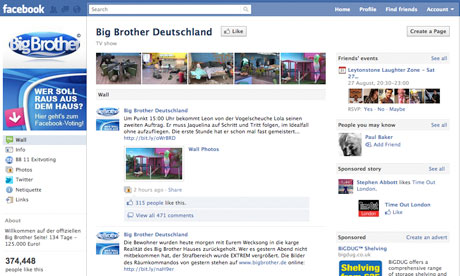
It's arguable whether we have seen any really meaningful examples of inventive, exploratory collaboration between broadcasters and web companies, but there were glimmers of hope in this afternoon's panel exploring the state of convergence.
Beyond the obligatory clarification of what convergence actually means – presumably for the benefit of the audience – this was really an opportunity for Channel 4 chief executive David Abraham and ITV's managing director of commercial and online Fru Hazlitt to flex their technical muscles, and prove that broadcasters really do get it. Both were fairly convincing, with a firm focus on the commercial potential of (finally) making money online.
Facebook's deal with Endemol to host Big Brother voting across Europe is an example of a simple, first-step level of interaction between broadcasters and the web, Facebook's director of platform partnerships Christian Hernandez explained.
In Germany, where the first partnership was rolled out last week, 10% of all votes are coming through Facebook and, he claimed, are supplemental to text and phone votes and so not cannibalising those revenues.
What's in it for Facebook, asked panel chair Steve Hewlett? Hernandez explained that users pay to vote for Big Brother using the universal Facebook Credits system, with 30% of revenues going to Facebook and 70% to Endemol; at current euro rates that equates to €0.70 per vote.
Hernandez was explicit about Facebook's objective: "We are an identity platform and want to make that pervasive through the web. Viewers can already log on to Channel4 with their Facebook identity … this kind of project is subsiding Facebook's long-term vision for what it wants to be the underlying identity platform for the web."
Abraham was emphatic in his response. "If you're creating data sources that other people are exploiting commercially then you don't have a business," he said. The commercial future for broadcasters depends, then, on understanding, creating and managing the pools of insight and information about consumers are being able to commercialise that. Channel 4 already has pools of information on its users, grouped according to their activity on different specialist areas of the C4 web and mobile site. But those need to be joined up and contextualised.
Does it make sense for Channel 4 to try to develop its own infrastructure for managing user identity, preferences and behaviour? Facebook has an entire business built on that, so why not just partner with them? I posed that question on Twitter.
Former Channel 4 head of cross-platform Matt Locke responded: "Giving up auth to a 3rd party is suicide. Use other platforms for social 'ripples', but you need to see the data yourself. Putting all these eggs in one basket is too risky a strategy. C4 need to develop own tools plus use 3rd parties."
"Her department will be one of the most interesting to watch in next few years…"
@paulblueeyedboy said the public value of Channel4 users' data should not be transferred to an organisation like Facebook.
Tom Loosemore, who used to run Channel 4's innovation investment fund 4ip, approved of Abraham's comments: "C4 is now barking up the right tree. Could even do something really interesting in VRM space if bold enough."
Locke pointed to Gill Pritchard, who was appointed director of audience technologies at Channel 4 earlier this year.

